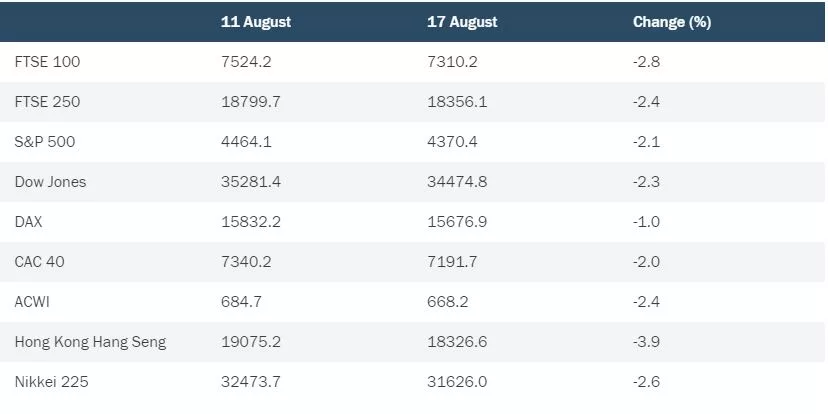Global stock markets sustained heavy losses this week with fears of slowing growth and rising interest rates weighing on sentiment
The latest signs that China is struggling to return to growth in the wake of its prolonged Covid lockdown have dragged share prices lower around the world, with investors increasingly concerned about the risk of another global slowdown. Markets also reacted negatively to evidence that the US economy is performing more strongly than expected. With central bank officials still focused on reducing inflation, the resilience of the world’s largest economy makes it more likely that interest rates will rise further this year, and that the long-awaited loosening of monetary policy will be delayed.
United States
On Wall Street, the Dow Jones Industrial Average ended trading on Thursday 2.3% down for the week so far, with the S&P 500 falling 2.1%. Official data showed a drop in the number of Americans making new unemployment claims, while retail sales in the US have remained relatively buoyant. Both factors are likely to add to existing inflationary pressures. Minutes from the most recent meeting of the Federal Reserve’s rate setting Federal Open Market Committee indicated that further hikes could be in the pipeline for 2023, and highlighted concerns from some officials about the potentially damaging medium-term impact of tighter monetary policy on business activity.
UK
In the UK, the FTSE 100 closed on Thursday 2.8% down for the week so far, with falling oil prices and sticky core inflation adding to investors’ concerns. While the UK’s headline consumer prices index (CPI) showed a welcome fall, core CPI – which excludes more volatile elements such as food and fuel – remained unchanged in July, thus raising the likelihood of further rate rises in the final months of the year. Data showing that wage growth had hit a record high did little to improve the mood, but there was a welcome fall in company insolvencies reported in England and Wales.
Europe
In Frankfurt, the DAX index ended Thursday’s session down 1% for the week, while France’s CAC 40 lost 2%. Stocks in the eurozone are particularly sensitive to the health of the Chinese economy, and this week’s downbeat data was bad news for the likes of consumer goods companies and motor manufacturers. The Netherlands became the latest European economy to fall into a technical recession following two consecutive quarters of contraction. However, sentiment among eurozone businesses appears to be improving.
Asia
In Asia, the Hang Seng index in Hong Kong slumped 3.9% as official figures highlighted weakening retail sales, property prices and industrial output. There were also concerns about the stability of the heavily indebted Chinese real estate sector. The unexpected decision by the People’s Bank of China to cut key interest rates was unable to cheer markets. Japan’s Nikkei 225 index of leading shares fell 2.6% despite starting the week positively on the news that the Japanese economy had grown twice as quickly as expected in the second quarter of the year. Stocks in Tokyo came back to earth on Thursday after data showed Japan’s exports had fallen for the first time in more than two years due to weakness in key Chinese markets.

Note: all market data contained within the article is sourced from Bloomberg unless stated otherwise, data as at 17 August 2023.

